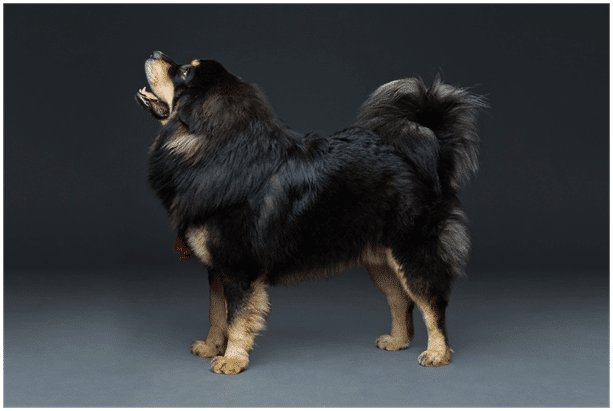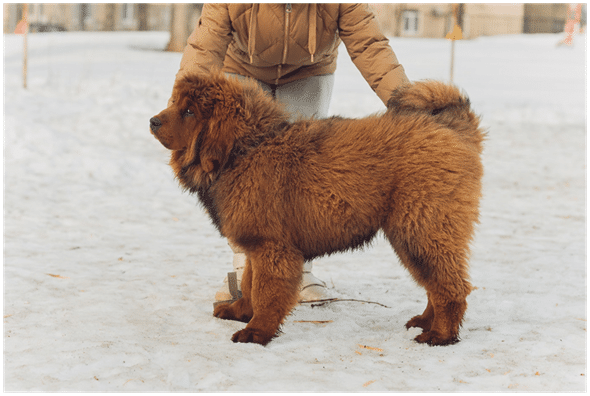If you’re considering getting a Tibetan Mastiff, you might be wondering if they make a good family pet. While they were originally bred as guard dogs and working dogs, they are becoming more popular in many American homes.
Tibetan Mastiffs are loyal, good natured, and protective dogs, which can make them good pets for most people. However, they can also be quite independent and stubborn, so you need to be prepared to handle these traits if you decide to get a Tibetan Mastiff.
In this article, we’ll take a look at some of the pros and cons of owning a Tibetan Mastiff, to help you decide if this breed is right for you.
Why choose a Tibetan Mastiff?
Each dog owner will have specific needs from dog ownership. This could include having a pet to play with your children. It might involve having a pet as an everyday companion for other pets in the home.
You may want a pet as an exercise partner, or as a guard dog for your home and family. There are many reasons why people may want to own a Tibetan Mastiff. We explore these in detail, along with outlining the various methods to enhance your relationship with your Tibetan Mastiff.
Are Tibetan Mastiffs good house dogs?
Some Tibetan Mastiffs may be perfectly content spending most of their time inside, while others may need plenty of exercise and outdoor time. Overall, however, Tibetan Mastiffs can make great house dogs if their needs are taken into account.
They are loyal and protective of their families, and often make excellent watchdogs. Tibetan Mastiffs may be less inclined to bark than some other breeds, but they will certainly let you know if there is something amiss.
They are also relatively easy to care for, requiring only a moderate amount of exercise and mental stimulation, along with regular grooming. If you are looking for a large, sturdy dog that will be a loyal member of your family, the Tibetan Mastiff may be the perfect breed for you.
Are Tibetan Mastiffs good with children?

Many people believe that the Tibetan Mastiff will make a good family pet, as they are typically gentle and good-natured.
Tibetan Mastiffs are generally great with children, but like any other dog, they need to be properly socialized and introduced to children at an early age.
They are also known for being very protective of their families and homes, so it is important to make sure that they are well-trained and socialized from a young age.
Their nature and size can sometimes be intimidating to strangers, so it is important to always be aware of your surroundings when out with your Tibetan Mastiff.
The other key factor is to supervise your children when they are around the dog, as Tibetan Mastiffs can sometimes be too rough with them. This could include knocking them down, jumping on them, or play biting.
With proper socialization and training from an early age, this behavior can be avoided.
Are Tibetan Mastiffs good with other dogs?
The Tibetan Mastiff is a breed of dog that is known for its loyalty and good temperament with other dogs. They are not typically aggressive towards other animals, and so make good family pets.
However, as with all breeds of dogs, socialization is key to ensuring that they get along well with other animals.
If you have another dog in your home, it is important to introduce the two animals slowly and carefully, allowing them to become comfortable with one another. Over time, this should result in a happy and harmonious household!
What is the temperament of a Tibetan Mastiff?
The Tibetan Mastiff breed is a large, powerful dog with a very independent streak. They are fiercely loyal to their family and friends but can be aloof and suspicious of strangers.
Tibetan Mastiffs need firm, consistent training and socialization from an early age to prevent them from becoming overly aggressive or territorial.
Their temperament can be described as a combination of guardian, watchdog, and herder. They are very intelligent, but also stubborn and headstrong.
Tibetan Mastiffs have moderate exercise requirements and require space to roam to move around. They may not be well suited for life in an apartment or small home.
With proper care and training, the Tibetan Mastiff can be a good family pet that is loving and devoted.
Do Tibetan Mastiffs like to cuddle?
Some Tibetan Mastiffs do enjoy cuddling, while others may not be overly affectionate. However, most Tibetan Mastiffs do tend to enjoy being close to their human companions and will often seek out physical affection. This can make them great family dogs which the entire family can enjoy.
If you have a Tibetan Mastiff that enjoys cuddling, then you should definitely take advantage of those moments!
Do Tibetan Mastiffs bark a lot?

Tibetan Mastiffs are not known for being particularly vocal dogs, but they can certainly bark when they feel the need to communicate something.
Some Tibetan Mastiffs may bark more frequently than others, but generally speaking, this breed is not known for being excessively vocal.
The most common reasons your Tibetan Mastiff will bark are if they are feeling territorial or protective, if they are greeting someone they know, or if they are trying to get your attention.
If your Tibetan Mastiff is barking frequently, it’s important to figure out why he’s doing it and address the issue.
In most cases, a little training will help curb any excessive barking. With a little patience and perseverance, you can have a well-behaved Tibetan Mastiff who barks only when necessary.
Are Tibetan Mastiffs aggressive?
Some people may perceive Tibetan Mastiffs as aggressive because of their large size and protective nature. However, with proper socialization and training, The Tibetan Mastiff can be a gentle giant that makes a good family pet.
Like all dogs, each individual Tibetan Mastiff has its own unique personality, so it’s important to get to know a dog before making any assumptions about its temperament.
Like many dog breeds, there are some situations that may result in your Tibetan Mastiff displaying aggression. Understanding why these situations occur will help avoid any aggressive behavior, or at least control and minimize these events from occurring.
Some of the more common reasons your Tibetan Mastiff may display aggression include:
- Fear
- Experiencing pain
- Defending territory or possessions
- Resource guarding
- Possessiveness
- Protection of family members
- Socialization issues
- Not enough daily exercise
If you think your Tibetan Mastiff may be showing signs of aggression, it’s important to consult with a professional trainer or behaviorist who can help you assess the situation and create a customized training plan.
When should you socialize your Tibetan Mastiff?
Tibetan Mastiffs that have not been properly socialized may be more prone to aggression.
Socialization is the process of exposing your dog to a variety of people, places, and situations in a positive way so that they can learn to accept them as normal parts of their life.
Without careful socialization, your dog may become fearful or anxious in new situations, which can lead to aggression.
“The best time to start socializing your Tibetan Mastiff is when it is a puppy. This allows them to develop positive associations with new things and helps them become well-adjusted adults.“
However, even adult dogs can benefit from socialization with people and other dogs, so don’t hesitate to get started if your dog is a bit older.
The key to successful socialization is to take it slow and make sure your dog is comfortable with each new experience. Gradually expose your dog to more and more situations until they are comfortable in almost any setting.
Keep in mind that some things will always be scary for dogs, so don’t push them too hard. Just relax and let them take things at their own pace.
The bottom line is that the Tibetan Mastiff can be a good pet as long as they receive proper socialization.
Are Tibetan Mastiffs easy to train?

Tibetan Mastiffs are not typically easy to train, as they can be quite stubborn and independent-minded. However, with patience and consistent training, most Tibetan Mastiffs can learn basic obedience commands and even some tricks.
It is important to keep training sessions short and interesting for the dog, as they can quickly become bored or frustrated.
Like all dogs, Tibetan Mastiffs will respond best to positive reinforcement such as treats or praise, rather than punishment.
How to Train your Tibetan Mastiff?
Training your Tibetan Mastiff can be tackled in many different ways. Two of the more important training activities are potty training and obedience training.
We discuss these in detail, along with providing helpful tips to make this a pleasant experience.
Potty Training for Tibetan Mastiffs
Many people find potty training their Tibetan Mastiff to be a daunting task. This is likely because of the myths and misinformation that are circulated about potty training dogs.
The truth is that potty training any dog, including a Tibetan Mastiff, is relatively easy when done correctly.
The first step in potty training your Tibetan Mastiff is to determine his or her individual bathroom habits. Some dogs will prefer to eliminate outdoors while others will only go outside.
Still, others will only eliminate indoors on certain surfaces such as newspapers or pee pads. Once you have determined your dog’s bathroom habits, you can begin to set up appropriate elimination areas and cues.
If your dog prefers to eliminate outdoors, make sure he has plenty of opportunities to do so by taking him for walks or letting him roam around in a fenced-in yard.
“If your dog typically eliminates indoors, set up an elimination area in a designated spot in your home and put down a pee pad or some other absorbent surface.“
When you notice your dog beginning to sniff or circle around, it’s time to take him to the elimination area.
Once your dog is consistently eliminating in the correct spot, you can begin to give him verbal cues such as “go potty” or “do your business.”
Repetition is key when teaching these cues, so make sure you use them frequently when your dog is in the appropriate elimination area. Eventually, your dog will learn to associate the cue with going to the bathroom and will respond accordingly.
Obedience Training for Tibetan Mastiff
The Tibetan Mastiff is a large, powerful dog that needs obedience training to ensure good behavior. Without it, the dog can become unmanageable and destructive.
Obedience training will also help build a strong relationship between the dog and its owner.
There are many different methods of obedience training, but all of them involve basic commands such as “sit”, “stay”, “come”, and “heel”.
The trainer must be consistent in giving these commands and providing rewards (such as treats or praise) when the dog follows them.
It’s important to start obedience training early (at the puppy stage), while your dog is still young. This will make it easier for the dog to learn the commands and to behave well.
Starting obedience training at a later age can be more difficult and may take longer to achieve results.
If you’re not sure how to start obedience training or need help with a disobedient dog, there are many professional trainers who can assist you.
Furthermore, you can access additional training opportunities through training videos often posted on YouTube.
Why you should find a reputable Breeder for your Tibetan Mastiff
When looking for a reputable breeder for your Tibetan Mastiff, it is important to find someone who is knowledgeable about the breed and who has a good reputation in the dog community.
A good breeder will be able to provide you with information about this wonderful giant breed, including temperament, health, and breeding history. They will also be able to help you find the right puppy for your family, based on your lifestyle and needs.
A good breeder will also screen potential buyers carefully, and will only sell puppies to responsible homes. They will also require that buyers sign a contract agreeing to spay or neuter the dog and to provide proper care for him.
By finding a reputable breeder, you can be sure that you are getting a healthy, well-bred Tibetan Mastiff that becomes a good family pet.


